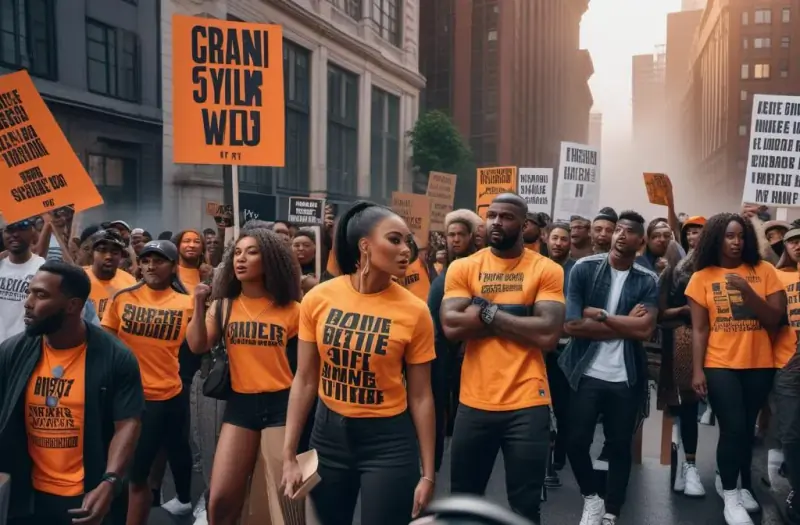The Rise of Celebrity Activism in Sports and Entertainment

Table of Contents
From stadiums to red carpets, public figures are using their visibility to spark change, start conversations, and pressure institutions. Whether it’s advocating for racial justice, environmental reforms, or mental health awareness, these icons leverage their followings to amplify underrepresented causes. But why has this shift become so pronounced in recent years? What changed in our cultural fabric to allow—and even expect—our favorite stars to take a stand?
Have we reached a point where staying silent is no longer acceptable for the famous? And what does this mean for the relationship between celebrity influence and real-world impact? Let’s explore how high-profile activism is reshaping both the sports arena and the entertainment stage.
The Evolution of Celebrity Activism: From Silent Supporters to Vocal Leaders
In decades past, celebrity involvement in politics or social issues was rare and often discouraged. Stars feared alienating their fanbase or jeopardizing endorsement deals. However, history still offers early glimpses of outspoken figures—Muhammad Ali’s refusal to be drafted into the Vietnam War and Jane Fonda’s anti-war protests being prime examples of courageous celebrity activism.
Fast forward to today, and this hesitance has been replaced with assertiveness. What once lived in private circles now dominates public feeds. With the explosion of social media, celebrities have direct access to millions and control their own narratives. This direct-to-audience format bypasses traditional media filters, enabling entertainers and athletes to champion causes like Black Lives Matter, LGBTQ+ rights, or climate change without waiting for a journalist to write the story.
This shift hasn’t been just about volume—it’s about substance. The messaging is clearer, the intentions more focused, and the outcomes more impactful. Many celebrities are now engaging in policy discussions, funding grassroots organizations, and even running for office. In short, the role of the modern celebrity has evolved from a detached figurehead to an active participant in shaping society.
Sports Activism: When Athletes Step Off the Field and Into the Fight

Athletes have always had a unique position in society. Their global platforms, combined with their physical achievements, lend them credibility that few others enjoy. Over the past decade, we’ve seen a surge in sports activism led by famous athletes unafraid to challenge the status quo.
Take Colin Kaepernick, whose kneeling protest during the national anthem sparked both outrage and inspiration. His stance against racial injustice became a cultural touchstone, igniting broader debates on police brutality and patriotism. Despite facing backlash and losing his NFL career, Kaepernick remains a symbol of athlete advocacy and star power activism.
Likewise, basketball icons like LeBron James have gone beyond the court, founding schools, producing documentaries on systemic inequality, and confronting political figures. Their influence extends far beyond sports, proving that celebrity-driven social movements can start in a locker room and ripple out globally.
Athlete activism trends reveal that fans now expect more than performance—they expect purpose. These sports personalities are no longer seen as apolitical role models but as agents of change, using their platforms to challenge injustice head-on.
Hollywood Activism and Entertainment Industry Advocacy
In the entertainment industry, Hollywood activism has become a defining trait of modern stardom. Stars now step onto award stages armed with more than thank-you notes—they bring messages of solidarity, resistance, and reform. Entertainment icons’ activism has transformed red carpets into platforms for protest and awareness.
One landmark moment was the Time’s Up movement, where actors and actresses wore black at the Golden Globes to protest sexual harassment and gender inequality. This was more than a symbolic gesture—it led to legal defense funds and inspired changes in workplace policy across industries.
Entertainment stars’ activism doesn’t stop at awards shows. Many have taken to producing or starring in socially conscious films, partnering with advocacy organizations, or launching their own foundations. Whether it’s Leonardo DiCaprio’s relentless environmental efforts or Angelina Jolie’s work with refugees, these celebrities use their influence to push humanitarian agendas forward.
The entertainment industry’s advocacy efforts are not without critics—some question the authenticity or effectiveness of such campaigns. However, data shows that celebrity philanthropy and endorsements for causes can significantly boost donations, public awareness, and policy attention.
The Power and Pitfalls of High-Profile Activism
While celebrity activism offers undeniable benefits, it’s not without its pitfalls. One major concern is performative activism—when stars speak out more for public praise than true impact. In such cases, their efforts can dilute serious causes or even backfire.
Another challenge is backlash. Celebrity influence on society can be polarizing, especially when stars align themselves with controversial issues. The internet can quickly become a battleground, with fans divided over entertainers’ political influence. Cancel culture adds another layer of complexity, punishing missteps while sometimes discouraging nuanced discussions.
Yet, when done authentically, celebrity humanitarian efforts and sports figures’ social change campaigns do more good than harm. By humanizing global issues and drawing attention to underrepresented voices, celebrities help bridge the gap between advocacy and public action.
To navigate these challenges, stars increasingly partner with credible organizations, undergo activism training, and involve themselves in long-term efforts. These strategies help ensure that their advocacy isn’t just loud—it’s lasting.
What’s Next: The Future of Celebrity-Driven Social Movements
The trajectory of celebrity-driven social movements suggests one thing: activism is here to stay in the spotlight. With the rise of new platforms like TikTok, Twitch, and decentralized media, entertainers and athletes can now connect with niche audiences in ways unimaginable a decade ago.
Younger celebrities, in particular, are stepping into activist roles from the start of their careers. They’re digitally native, socially aware, and unafraid to merge branding with beliefs. Expect this trend to intensify, with stars continuing to reshape how we think about fame and responsibility.
As audiences, we also have a role to play. We must stay informed, engage critically, and hold both institutions and influencers accountable. In doing so, we help shape an environment where high-profile activism becomes a force for genuine, positive transformation.
FAQs
What is celebrity activism?
Celebrity activism refers to the involvement of public figures—like athletes and entertainers—in political, social, or humanitarian causes.
Why is celebrity activism on the rise?
Social media has enabled celebrities to communicate directly with the public, allowing them to advocate for causes without traditional media gatekeepers.
How does sports activism differ from Hollywood activism?
Sports activism often focuses on racial justice and community empowerment, while Hollywood activism tends to spotlight issues like gender rights, climate change, and humanitarian aid.
Is celebrity influence on society always positive?
Not necessarily. While many celebrities make meaningful impacts, others risk promoting causes superficially or spreading misinformation.
Can celebrity endorsements for causes actually make a difference?
Yes. Studies show that celebrity endorsements can boost donations, increase media coverage, and sway public opinion on social issues.
Popular Tags
ADS SPACE HERE


